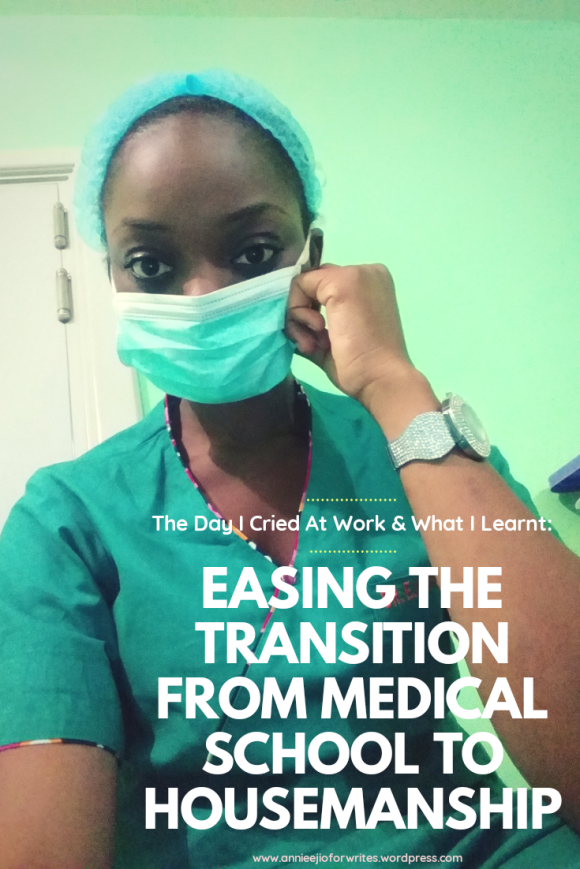“I have never been a house officer. If I have, I wouldn’t be asking you!” I yelled.
“Are you raising your voice on me?” he demanded.
“No! I am only telling you how I feel,” I cried.
I was exhausted. I had come to the end of a long thread that held my stretched emotions together.
It was my second week as a house officer (a newly qualified and practising medical doctor) and I was eagerly looking forward to the end of the week, what would mark the end of a two-week rotation – my first rotation in Surgery and housemanship as a whole. This tirade was taking place in the middle of the night, just outside the ward, between myself and a senior registrar.
I was the sole house officer in the unit and the unit had no registrar. So, I was left to relate directly with the senior registrars in the unit, breaking the usual work hierarchy: fellow house officer – registrar – senior registrar – consultant. It also meant that I had no one to assist me with the responsibilities that were expected from me, like securing intravenous access and obtaining blood samples.

I had different types of senior registrars (SRs). They were four in total but I would class them into three groups: The nice, the kind and the unkind. On this night, I was on call with one of the SRs I categorised unkind. He hated that he was made to leave his residence within the hospital and come to the ward to assist his incompetent house officer (HO) with something as basic as securing an intravenous access. I, on the other hand, had reservations about calling him and rather chose to keep at it until I succeeded.
After watching me make several unsuccessful attempts, the nurse on duty insisted that I sought help from the SR whom I was on the call duty with. When she saw my lingering hesitation, she decided to call him herself as the little child in question was starting to get dehydrated and consequently hyperglycaemic. Upon calling him, he called me and asked that I find a colleague to assist me. “That’s what other HOs do,” he buttressed.
It was about 3 am and the Paediatric Surgery complex was situated far from the house officers residence. Besides, I was new on the job and only had one colleague who was my classmate from the university and resumed some months before I did. I couldn’t request for her to come at that time, and tried to explain the same to him. Tired of observing the back and forth between myself and the SR, the nurse threatened to inform the unit consultant.
Shortly afterwards, he stomped into the ward, secured the intravenous access and outlined the plan for correcting the dehydration and hyperglycaemia. Then he turned back to me, “I gave you an assignment during the day and asked you to send me the answer as a text message and you didn’t!”
“I did the assignment even though I failed to send it to you,” I placated. Earlier that day, I inquired from him about two similar drugs for a patient, and rather than clarifying me, he made it into an assignment, leaving me with my confusion and at the mercy of another SR who was kind enough to teach and explain to me. I didn’t pay attention to the last part of the instruction.
Then he began shouting at me, talking about how I could not do basic things and needed help with everything. Prior to this time, I had endured the subtle and overt jabs they made at me all week, and focused on completing the rotation and exiting the unit. At this juncture, I was fatigued, mentally and emotionally fagged out and could not take on any more verbal assault, and that’s when I yelled back at him. He was dazed and ordered me to leave the unit. I could not care less at that point. All I wanted was a break – to rest.

– My friends and I on the day of our induction.
Doctors face diverse stress at work that span from physical to mental and psychological stress, and this is multiplied even so for new doctors. In medical school, you are mainly given the knowledge and little to nothing skills needed to excel at medical practice, but nothing and no one prepares you for the tall challenge and great shift you would face practising the profession.
Most doctors come into work without a formal orientation on what is expected from them and how to go about it. They are forced to learn by observation, from their peers who are either weeks or months ahead of them or worse still, from their mistakes. Sadly, medicine is neither like hair making nor fashion designing where the consequence of inexperience is either an ugly-looking hairstyle or a badly designed outfit that can be reversed, but a dealing with invaluable human life, where a trivial error can make the difference between life and death.
The excitement of completing medical school and commencing one’s practice as a medical doctor is quickly smothered by the insane work stress and sometimes toxic work environment that doctors encounter. You will find a new doctor juggling their new work demand, the fear of failing or making a mistake with inexperience and its attendant incompetence.
More than anything, at this stage, these persons need grace, guidance and kindness from their colleagues, seniors, other health workers and even patients and their relatives. Unfortunately, not many persons are generous with these traits and a new doctor would have to build resilience while learning on the job. It’s easier for some than it is for others and different factors account for this.
I arrived at this conclusion in the course of my housemanship: Patience and kindness are vital when leading those less knowledgeable and skilled than you are. New doctors (employees) don’t need their seniors to be nice to them as it can hinder their learning and growth, but they need you to be patient and kind with them.

– My friend, Chichi whom I can’t tell this story completely without acknowledging the invaluable role she played and assistance she provided. ❤
For new doctors, never confuse inexperience with incompetence. You are new on the job, not bad at the job. Always ask questions where you have difficulty or face a challenge. Do not merely carry out instructions or your responsibilities without an insight into why you are doing so. You are interning, learning to practise under supervision for a purpose. It’s okay not to know.
Magnify your responsibilities. As little or inconsequential as you may be made to feel, you are an essential member of the team. Some of your seniors may recognise this and appreciate your contribution, others may not. Focus on the good work you are doing and the patient whose ailment you are making lighter. As much as you can, endeavour to maintain relationship with your family and friends, make new friends if you need to, get a hobby and find healthy ways to destress. You eventually get better and soon become a badass HO.
I describe my first two weeks of housemanship as hellish. I was required to sleep in the Paediatric Surgery call room the entire fourteen days of the posting, was on call duty every day, sleep deprived for several days on end and chronically stressed. It was so much that when I moved to a new unit, I was sleeping on my feet one day in the course of the rounds.
Tell me, how was your transition from medical school to medical practice like? What situations and persons eased the process for you? What other ways can we help new doctors and medical students settle back easier into the profession?
Love,
Annie.


6 replies on “The Day I Cried At Work: My Rough Transition From Medical School To Housemanship”
That transition period is definitely one hell of a period!
I didn’t have a hard time as my colleagues who resumed at the same time with me because I have been defiant for a long time (I-know-you-cannot-beat-me attitude), plus my skin is as thick as that of a Sperm Whale!
I have always believed that the difference between the senior and the junior is time and have always applied this as I helped other people through their transition periods.
PS: las las all of us go jam for PLAB 2 venue.
LikeLiked by 1 person
Your postscript, 😩🤣🤣🤣 It’s important to help new doctors in every way that one can.
LikeLike
[…] After my first week, the dreadful question stopped coming and I had to deal with my new challenge: navigating the murky waters of housemanship. […]
LikeLiked by 1 person
[…] That was because I slept in the call room for the entire fourteen days of my first rotation –Paediatric Surgery! Yeah, it was that […]
LikeLiked by 1 person
[…] transition from girlfriend to fiancée was not a smooth one. I let fear engulf me and paralyze my mind and even my […]
LikeLiked by 1 person
[…] Post date August 11, 2020 […]
LikeLiked by 1 person